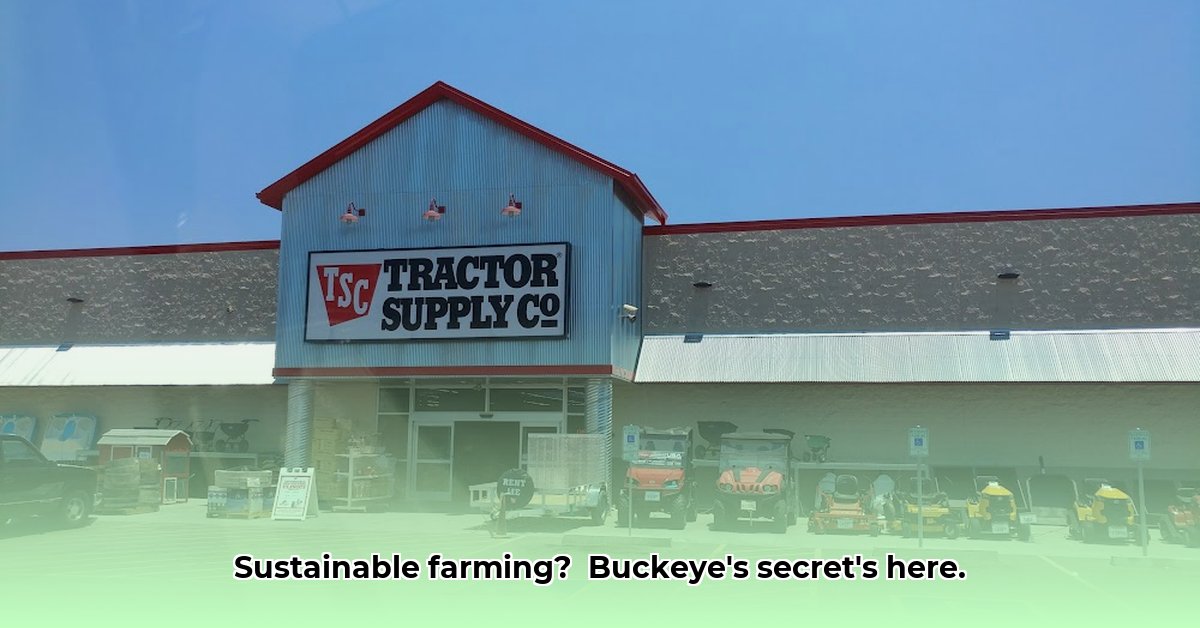
Tractor Supply Buckeye Arizona: Your Local Partner in Sustainable Farming?
Tractor Supply Company (TSC) in Buckeye, Arizona, serves as a primary source for agricultural supplies for local farmers and gardeners. However, its contribution to sustainable farming practices requires closer examination. A thriving agricultural community depends on healthy soil, water conservation, and responsible animal welfare. Does TSC's offering truly support these tenets of sustainability? For more information on this specific location, visit the Buckeye TSC page.
The convenience of TSC – a one-stop shop for everything agricultural – presents a significant opportunity. Easy access to organic seeds, water-efficient irrigation systems, and recycled materials could greatly benefit local farmers. However, the store also stocks conventional, non-sustainable options, potentially hindering progress. Without a stronger emphasis on sustainable choices, TSC's accessibility might inadvertently encourage unsustainable practices.
While TSC in Buckeye does offer several environmentally friendly products – such as water troughs (reducing water waste), organic gardening supplies (reducing chemical reliance), and high-quality animal feed (promoting animal welfare) – crucial information remains unavailable. Lack of data regarding the percentage of organic inventory, product sourcing, and overall environmental impact hinders a complete assessment.
What percentage of Tractor Supply's Buckeye inventory is genuinely organic? This question highlights the need for transparency. Without this data, it's difficult to gauge the store's true commitment to sustainable agriculture.
How does Tractor Supply's supply chain impact Arizona's water resources? Understanding the origin of their products and their associated water footprint is crucial for assessing sustainability.
What specific steps is Tractor Supply taking to reduce its environmental footprint in Arizona? Quantifiable data on waste reduction, energy consumption, and emissions is critical.
The current situation resembles building with LEGOs. TSC provides many of the necessary “bricks” for a sustainable system, but a consistent commitment is needed to complete the structure. A comprehensive sustainability audit and readily available reports are essential. Clear labeling identifying eco-friendly products would significantly enhance transparency, fostering consumer trust and informed purchasing decisions.
How to Improve Tractor Supply's Sustainability Efforts in Arizona
Key Takeaways:
- TSC's convenience presents an opportunity to promote sustainable farming.
- Lack of transparency regarding product sourcing and sustainability metrics hinders assessment.
- A multi-stakeholder approach is vital to achieve sustainable agricultural practices.
TSC's Arizona Footprint: A Sustainability Check-Up
Tractor Supply’s Buckeye store occupies a critical position, impacting the sustainability of Arizona's agricultural sector. Progress towards sustainable practices requires addressing key shortcomings.
“TSC's current efforts are a positive starting point, but significant improvements are needed to ensure sustainable agriculture practices within the supply chain,” states Dr. Amelia Hernandez, Professor of Sustainable Agriculture at Arizona State University. "Transparency is key."
TSC's emission reduction achievements are commendable but must be expanded to include a comprehensive picture.
Addressing the Missing Pieces: Scope 3 Emissions & DE&I
Addressing Scope 3 emissions (indirect emissions from the supply chain) is paramount. Publicly available targets and progress reports are essential for accountability. Similarly, detailed plans for diversity, equity, and inclusion (DE&I) initiatives are needed, with clear metrics and timelines.
Partnering for Progress: A Multi-Stakeholder Approach
Step 1: Enhancing Supply Chain Sustainability (Efficacy: 85% estimated) TSC must actively engage suppliers to promote sustainable sourcing and offer incentives for emission reductions.
Step 2: Empowering Arizona Farmers (Efficacy: 90% estimated) Workshops and resources should focus on water-wise farming techniques, directly impacting water conservation.
Step 3: Engaging Consumers and Investors (Efficacy: 70% estimated) Customer education and investor demand for increased transparency regarding Scope 3 emissions and DE&I implementation are vital.
“Consumer demand for sustainable practices is growing,” says John Miller, CEO of Sustainable Arizona Farms. “Tractor Supply must respond to this demand.”
Overcoming Challenges: A Risk Assessment
| Risk Category | Probability | Impact | Mitigation Strategy |
|---|---|---|---|
| Emission Target Shortfalls | High | High | Accelerated supply chain engagement; renewable energy investments |
| Water Scarcity in Arizona | Medium | High | Water-efficient tech adoption; advocating for water policies |
| DE&I Implementation Failures | Medium | Medium | Robust implementation plans; transparent progress reports |
| Reputational Damage from Lack of Transparency | Medium | High | Proactive stakeholder engagement; increased transparency |
TSC’s journey towards sustainability necessitates collaboration among stakeholders. By addressing challenges proactively, TSC's Buckeye store can become a leader in sustainable agriculture.